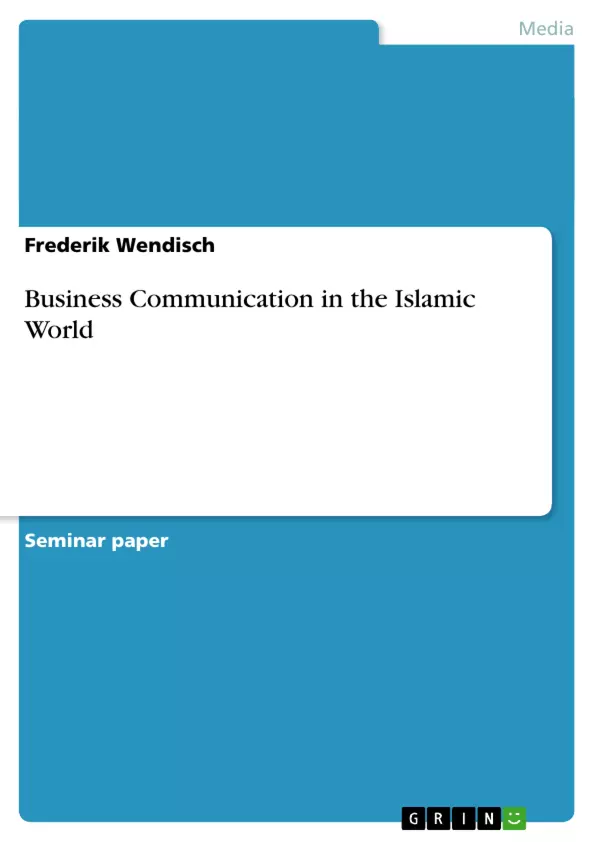What is it most people associate with thoughts of the Islamic or Arab World? It is true, no one will forget the horrible pictures of the Gulf Wars from 1980 to 1991 or the attack of radical Muslims on the USA on September 11, 2001, but dictators like Saddam Hussein and Osama bin Laden do not mirror the whole of the Islamic world. These radical Muslims and terror attacks are only exceptions, and it is not fair to see only this side. There are fanatics from other religions or racial offenders in the Western World as well, and it is unfair to think they are all the same because they belong to the same religious group. There are about 1.3 billion Muslims in the world and for the most part, they want only to exercise their religion without any aggressive intentions.
When presented with the term “Arabic”, more traditional minds might think of men riding camels through the desert, wearing turbans. This is the more accurate image of the Islamic world; a very custom rich culture with an intense focus on hospitality .
While both of these images are true, what people must recognize is the enormous business power these countries possess; and this power lies in much more than oil alone. Dubai, for example, is one of the fastest growing cities in the world with investments of hundreds of billions of US-dollars each year . It seems that there are no limits set in the world of the sheiks. In Dubai they have the Burj al-arab—the only seven-star hotel in the world—and a snow dome that offers skiing, even with the temperature outside at 50 . Furthermore, in Dubai they are building the 560 metres high Burj Dubai, which will be the highest skyscraper in the world after its completion . All this considered, it is obvious that it could be profitable to have a look at the Arabic countries for businessmen and investors.
This was a short introduction to answer the question of “Why” conducting business with the Arabic world could be profitable. The following section will focus on the “How” aspect. I will explain how to cultivate a cooperative environment with Islamic business partners by describing their cultural views and customs, and what people should focus on or avoid in business transactions. It will be a general overview because Dubai is not like Bahrain, in the same way Germany is not like France, but there is one binding element for these countries – their religion.
Inhaltsverzeichnis (Table of Contents)
- I. Introduction
- II. The basic principles
- 1. religion
- a.) Shahâda statement of beliefs
- b.) Salat-prayer
- c.) Zakat - Tax for Charity
- d.) Saum fasting
- e.) Haddsch - pilgrimage
- 2. family
- 3. honour/saving face
- 1. religion
- III. Doing business
- 1. verbal communication
- 2. nonverbal communication
- 3. welcome
- 4. small talk
- 5. negotiations
- 6. networking
- 7. hospitality
- IV. Summary/conclusion
Zielsetzung und Themenschwerpunkte (Objectives and Key Themes)
This paper aims to provide an insightful look into business communication within the Islamic world, highlighting the unique cultural context that influences business practices and interactions. It explores the specific aspects of Islamic culture and its influence on business communication, offering a nuanced understanding beyond common stereotypes.
- The influence of Islamic beliefs and practices on business communication.
- The importance of family, honor, and saving face in business relationships.
- The significance of verbal and nonverbal communication styles in the Islamic context.
- The role of hospitality and networking in building business relationships within the Islamic world.
- The growing business potential of Islamic countries and their role in the global economy.
Zusammenfassung der Kapitel (Chapter Summaries)
The first chapter provides a broad introduction to the Islamic world, challenging common misconceptions and highlighting its diverse nature. It emphasizes the growing economic importance of Islamic countries, particularly Dubai, and its potential for business ventures.
The second chapter delves into the fundamental principles of Islamic culture that shape business communication. It examines key aspects of Islamic faith like the five pillars of Islam and their impact on individual and collective values.
The third chapter explores the practical aspects of doing business in the Islamic world. It examines various aspects of communication, including verbal and nonverbal cues, as well as the significance of hospitality, networking, and negotiation practices within the cultural context of Islamic society.
Schlüsselwörter (Keywords)
This paper explores the key concepts of business communication, Islamic culture, cultural influence, verbal communication, nonverbal communication, hospitality, networking, negotiation, and the economic significance of Islamic countries.
Frequently Asked Questions
What are the core cultural principles of Islamic business?
The core principles include religious devotion (the Five Pillars), the central importance of family, and the concept of "saving face" or personal honor.
How does religion influence business communication in Arab countries?
Religion is a binding element that dictates daily schedules (prayers), ethical standards, and social interactions, emphasizing hospitality and trust.
What should Westerners know about nonverbal communication in the Islamic world?
Nonverbal cues, such as physical distance, eye contact, and gestures, are deeply rooted in cultural traditions and are vital for building rapport and respect.
Why is Dubai highlighted as a business hub?
Dubai is one of the fastest-growing cities globally, with massive investments in infrastructure like the Burj Khalifa and diverse industries beyond oil.
What is the significance of hospitality in Arabic business culture?
Hospitality is a cornerstone of relationship-building; business is often conducted over meals or small talk to establish mutual trust before negotiations begin.
- Quote paper
- Frederik Wendisch (Author), 2007, Business Communication in the Islamic World, Munich, GRIN Verlag, https://www.grin.com/document/84392



